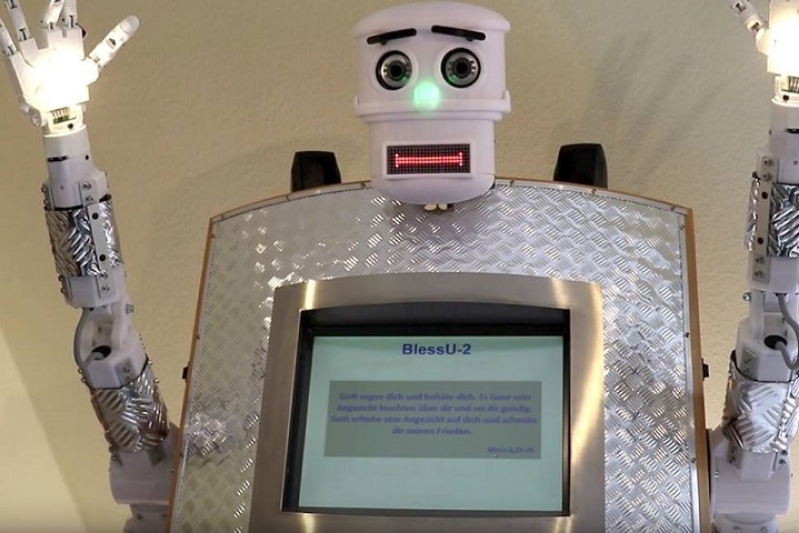
A robot priest that raises its hands and declares God's blessings was recently unveiled in Germany, sparking curiosity from nonchurchgoers and earning criticism from "church-oriented" groups.
The robot priest, aptly called Bless U-2, offers blessings in five different languages: German, English, French, Spanish or Polish. Those who seek to receive blessing can also choose between a male and a female voice, according to The Guardian.
As the robot raises its arms, the way believers often do when they worship, its hands emit light. Mimicking human movement, the robot's mouth opens and its eyes move as it recites Bible verses.
"God bless and protect you," it says after reciting pre-installed biblical passages.
Bless U-2 also asks God to shine His face over the people and to show them mercy, The Sun reported.
And when it is done uttering the blessings, it gives people an option to have their blessings printed.
A backup robot is on standby in case of breakdown.
The introduction of the robot priest earned mixed reactions. Some people received it positively, according to Stephan Krebs of the Protestant church in Hesse and Nassau.
"People from the street are curious, amused and interested," Krebs told The Guardian. "They are really taken with it, and are very positive."
However, others, particularly the faithful churchgoers, do not welcome the idea, primarily because they believe the initiative was meant to replace ministers with robots.
"Inside the church some people think we want to replace human pastors with machines," Krebs said. "Those that are church-oriented are more critical."
Although Krebs admitted there is a priest shortage in Germany, he clarified that the robot priest "could never substitute for pastoral care."
But he and the others behind the initiative wanted to provoke debate if it is necessary for a human to declare blessing, or if a machine can do the job, Krebs explained.
"We wanted people to consider if it is possible to be blessed by a machine, or if a human being is needed," he said.
"We don't want to robotise our church work, but see if we can bring a theological perspective to a machine."
Ironically, the robot priest was introduced as part of an exhibition commemorating the anniversary of the Reformation's beginning in Europe, a time when technology played a major role in reproducing Martin Luther's 95 theses through the use of revolutionary printing presses.
Luther's controversial propositions challenged the church tradition of issuing indulgences and even questioned the pope's authority to issue such indulgences. This gave rise to the Reformation movement that is anchored on Romans 1:17: "For in it the righteousness of God is revealed from faith for faith, as it is written, 'The righteous shall live by faith.'"
The use of technology in the form of a robotic priest is also challenging church tradition, but serves as evidence of a weakening church in Europe, according to a commentary published in The Federalist.
The article said the introduction of Bless U-2 "seems like a deliberate attempt to talk about something other than what Christianity is and why Europeans, like all people, desperately need to hear the gospel of Jesus Christ for their eternal salvation."
The commentary criticized Krebs and the others involved in the project for drawing people's attention to debate about the possibility of receiving blessings from a robot instead of drawing them "into the mysteries of faith."
In recent years, Christian churches in Europe have suffered from declining attendance. Last year, the weekly attendance of the Church of England dropped to 760,000—the first time it has gone below 1 million—comprising only less than 2 percent of the population, according to another report from The Guardian.
Growing secularism, such as issues about gay rights, within the church was identified as a major factor that contributed to the dwindling service attendance.
To address the problem, the church has developed a "reform and renewal" program to reverse the decline. One focus of the program is to divert funds from smaller rural parishes to urban churches with a promising potential for church growth.
"In some parts of the Communion decline in numbers has been a pattern for many years. In England our numbers have been falling at about 1% every year since world war two ... ," Justin Welby, the archbishop of Canterbury, said.
"The culture [is] becoming anti-Christian, whether it is on matters of sexual morality, or the care for people at the beginning or the end of life. It is easy to paint a very gloomy picture."
A projection based on statistical information estimates that Christianity in Britain will "come to an end" in 2067 if present trends continue, according to an article from The Spectator.
"That is the year in which the Christians who have inherited the faith of their British ancestors will become statistically invisible," the article said. "Parish churches everywhere will have been adapted for secular use, demolished or abandoned."
Although figures show that the number of church members in Europe are steadily declining, this does not mean the church will die. In the Bible, Jesus said the "gates of hell shall not prevail" against His church.
The book of Revelation also records a great multitude "from every nation, from all tribes and peoples and languages" that could not be counted praising God.






